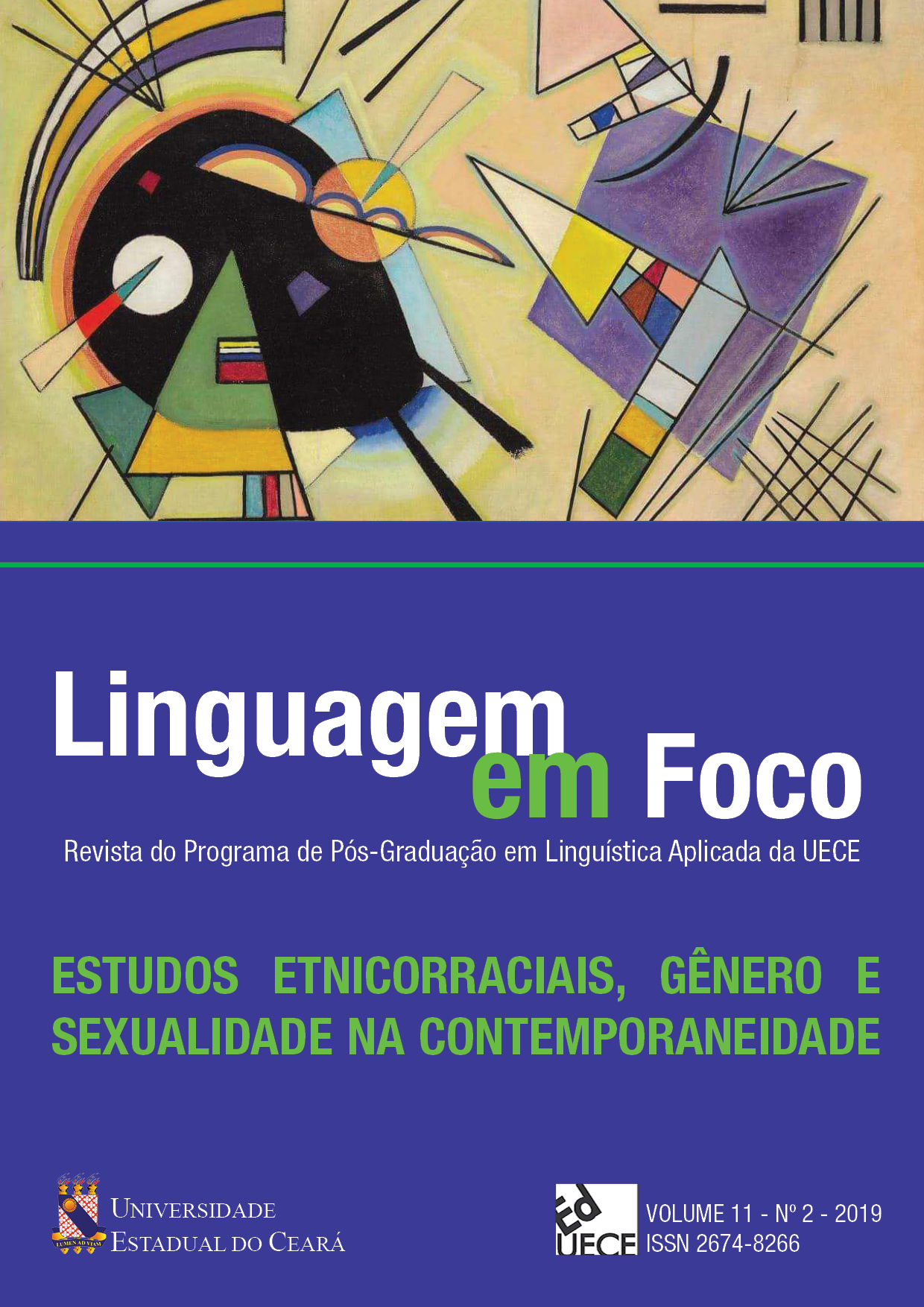Manifestations of Racism and Prejudice in Cordel Peleja do Cego Aderaldo with Zé Pretinho do Tucum, by Firm Teixeira do Amaral
Analysis of a Basic Reading Sequence
DOI:
https://doi.org/10.46230/2674-8266-11-2916Keywords:
Cordel, Fight of Cego Aderaldo with Zé Pretinho do Tucum, Prejudice and racism, Basic sequenceAbstract
This work analyzes a basic reading sequence through the Fight of the Blind man Aderaldo cord with Zé Pretinho do Tucum, by Firmino Teixeira do Amaral, developed in an 8th grade elementary school class at a state public school. Such analysis aims to highlight and discuss the manifestations of racism and prejudice present in the work. Methodologically, the basic sequence is that proposed by Rildo Cosson (2014), in which the meanings of the text are mobilized through motivation, introduction, reading and interpretation. As a theoretical basis, we used the following authors: Pinheiro (2012), Bajour (2012), Candau (2003), Leite (2008) and Marinho (2012). Reading the cordel raised two questions a priori to the teacher: how can the teacher work the cordel as a proposal for a basic reading sequence, in the Portuguese language discipline? How (s) to address the issue of racism? In addition, the students expressed the question: why is racism manifested in the cordel? These questions guided the development of this text, which pointed out as reflections on how cordel literature can lead the teacher to a socially significant teaching practice, in addition to enabling a way to enhance the student's critical thinking. As a result of the analysis, we evidenced that the students had perception of the manifestations of racism and prejudice presented in the cordel under study, being critically positioned before such manifestations.
Downloads
References
AMARAL, F. T. do. Peleja do Cego Aderaldo com Zé Pretinho do Tucum. São Paulo: Luzeiro, 2011.
BARROS, M. P. Relações de gênero na literatura de cordel. Curitiba: Appris, 2015.
BAJOUR, C. Ouvir nas entrelinhas: o valor da escuta nas práticas de leitura. Tradução de Alexandre Morales. São Paulo: Pulo do Gato, 2012.
BRASIL. Secretaria de Educação Fundamental. Parâmetros curriculares nacionais: terceiro e quarto ciclos do ensino fundamental: língua portuguesa. Brasília: MEC, 1998.
______. Secretaria de Educação Fundamental. Base Nacional Comum Curricular. Brasília: MEC, 2018.
CANDAU, V. M. (Org.). Somos tod@s iguais? Escola, discriminação e educação em direitos humanos. Rio de Janeiro: DP&A, 2003.
CANDIDO, A. O direito à literatura. In: ______. Vários escritos. 6. ed. São Paulo: Duas Cidades, 2017.
COSSON, R. Letramento literário: teoria e prática. 2. ed., 4. reimp. São Paulo: Contexto, 2014.
FERREIRA, J. P. Cavalaria de cordel: o passo das águas mortas. São Paulo: Hucitec, 1993.
GOMES, N. L. Educação e relações raciais: refletindo sobre algumas estratégias de atuação. In: MUNANGA, Kabengele (Org.). Superando o Racismo na escola. 2. ed. rev. Brasília: Ministério da Educação; Secretaria de Educação Continuada, Alfabetização e Diversidade, 2005.
LEITE, M. Q. Preconceito e intolerância na linguagem. São Paulo: Contexto, 2008. (Coleção Linguagem e Ensino).
MARINHO, A. C. O cordel no cotidiano escolar. São Paulo: Cortez, 2012. (Coleção Trabalhando com... na Escola).
MUNANGA, K. Educação e diversidade cultural. Cadernos PENESB: Discussões sobre o Negro na Contemporaneidade e suas Demandas, Niterói, Rio de Janeiro, n. 10, jan./jun., 2010.
PINHEIRO, J. H. Diga um verso bem bonito. In: SILVVA, Débora C. S; CAMARGO, Goiandira O.; GUIMARAES, Maria S. B. (Orgs.). Olhar o poema: teoria e prática do letramento poético. Goiânia: Cânone, 2012.
PROENÇA, I. C. A ideologia do cordel. 2. ed. Rio de Janeiro: Editora Brasília, 1977.
REPÚBLICA, Presidência da. Estatuto da Igualdade Racial, Lei nº 12.288, de 20 de julho de 2010. Brasília: Secretaria de Políticas de Promoção da Igualdade Racial, 2013.
SANTOS, Arisvaldo da S. Literatura de cordel e interdisciplinaridade: rumos da literatura popular no Tocantins. 2017. Dissertação (Mestrado em Ensino de Língua e Literatura) – Universidade Federal do Tocantins, Palmas, 2017.
SINGER, Paul. Radiografia da “democracia racial” brasileira. In: REIS, Nelson dos. Racismo cordial: a mais completa análise sobre preconceito de cor no Brasil. São Paulo: Ática, 1995.
SOUSA, M. R. de. O cordel na sala de aula: a ressignificação do ensino de língua portuguesa [manuscrito]. 2014. Monografia (Especialização em Fundamentos da Educação: Práticas Pedagógicas Interdisciplinares) – Universidade Estadual da Paraíba, João Pessoa, 2014.
SOUZA, G. de. Poesia: um castelo e muitas pedras. In: ______. Poesia para crianças: conceitos, tendências e práticas. Curitiba: Piá, 2012.
VIEIRA, M. C.; BUSTAMANTE, L. Vergonha brasileira. Revista Veja, [S.l.], 17 nov. 2017.
Downloads
Published
How to Cite
Issue
Section
License
Copyright (c) 2020 Leomar Alves de Sousa, Eliane Cristina Testa

This work is licensed under a Creative Commons Attribution 4.0 International License.
Authors who publish in Linguagem em Foco Scientific Journal agree to the following terms:
- Authors retain the copyright and grant the journal the right of first publication. The articles are simultaneously licensed under the Creative Commons Attribution License which allows sharing the work with an acknowledgement of its authorship and initial publication in this journal.
- The concepts issued in signed articles are the absolute and exclusive responsibility of their authors. Therefore, we request a Statement of Copyright, which must be submitted with the manuscript as a Supplementary Document.
- Authors are authorized to make the version of the text published in Linguagem em Foco Scientific Journal available in institutional repositories or other academic work distribution platforms (ex. ResearchGate, Academia.edu).





























